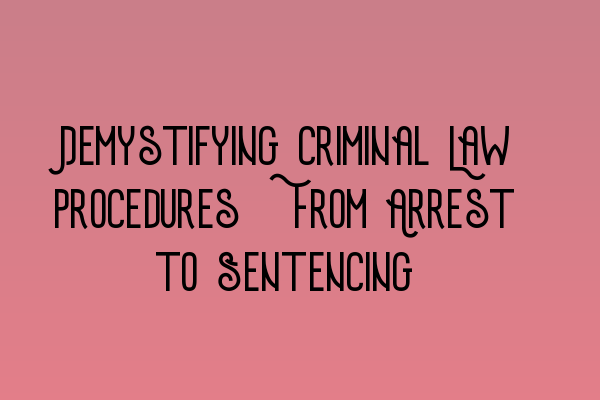Demystifying Criminal Law Procedures: From Arrest to Sentencing
Understanding the criminal law procedures is essential for anyone involved in the legal profession. Whether you are a solicitor, barrister, or aspiring legal professional, having a thorough knowledge of the criminal justice system is crucial. In this blog post, we will take you through the journey from arrest to sentencing, demystifying the process and shedding light on important aspects along the way.
Arrest: The Beginning of a Legal Journey
It all starts with an arrest. When a person is suspected of committing a crime, law enforcement officers have the power to apprehend them. This is the first step in the criminal law procedure, and it marks the beginning of a legal journey. If a suspect is arrested, they have the right to remain silent and seek legal representation. It is crucial to exercise these rights to ensure fair treatment throughout the process.
After the arrest, the suspect is taken into custody and they may be questioned by the police. This is known as the police interview stage. It is important to understand the rights of the suspect during the interview process and ensure that the police conduct themselves in accordance with the law.
Investigation: Gathering Evidence
Following the arrest, the investigation phase begins. This is where law enforcement agencies collect evidence to build a case against the suspect. The evidence can include witness testimonies, forensic analysis, CCTV footage, and any other relevant information that helps establish guilt or innocence. The strength of the evidence plays a crucial role in determining the outcome of the case.
During the investigation, it is essential to follow proper procedures and respect the rights of all parties involved. This ensures that the evidence gathered is admissible in court and that the suspect’s rights are protected. If any procedural errors occur during the investigation, it may lead to the evidence being deemed inadmissible, which can significantly impact the outcome of the case.
Charging: Formal Accusation
Once the investigation is complete, the prosecuting authority decides whether to bring charges against the suspect. This decision is based on the strength of the evidence gathered during the investigation. If the decision is made to charge the suspect, they will be brought before a court to face the formal accusation.
At this stage, it is crucial for the defense to examine the evidence against the accused and prepare a defense strategy. Any weaknesses in the prosecution’s case should be identified and challenged effectively to ensure a fair trial. This requires a thorough understanding of criminal law and the ability to navigate the legal system efficiently.
Court Proceedings: Putting the Evidence to Test
Once the case reaches the court, the trial proceedings begin. This is where the prosecution and defense present their cases and put the evidence to the test. The trial involves the examination of witnesses, cross-examination, and presentation of legal arguments. Ultimately, the goal is to establish the guilt or innocence of the accused beyond a reasonable doubt.
During the trial, it is essential for the defense to challenge the prosecution’s case and present a robust defense strategy. This requires a deep understanding of the applicable laws and the ability to present persuasive arguments in court. A skilled criminal law solicitor can make a significant difference in the outcome of a trial.
Sentencing: Determining the Punishment
If the accused is found guilty, the next phase is the sentencing. This is where the court determines the appropriate punishment for the crime committed. The judge takes into consideration various factors such as the severity of the offense, the offender’s criminal history, and any mitigating or aggravating circumstances before passing the sentence.
It is crucial to have a legal representative who can advocate for a fair and lenient sentence during this stage. A skilled solicitor can present compelling arguments and provide mitigating factors that can influence the judge’s decision. Likewise, the prosecution may argue for a more severe sentence, emphasizing the aggravating circumstances of the case.
Conclusion
Understanding the criminal law procedures is essential for anyone involved in the legal profession. From arrest to sentencing, each step carries its own challenges and requires a comprehensive understanding of the law. By demystifying the process, we hope to shed light on this intricate area of the legal system.
If you are interested in further reading on criminal law procedures or preparing for the SQE exams, check out our related articles:
- SQE 1 Practice Exam Questions
- SQE 1 Practice Mocks FLK1 FLK2
- SQE 2 Preparation Courses
- SQE 1 Preparation Courses
- SRA SQE Exam Dates
